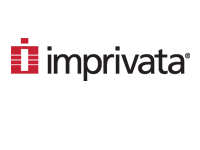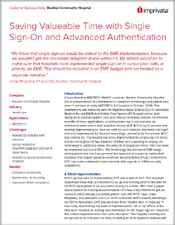Resource:
Single Sign-On and Advanced Authentication Save Valuable Time at Boulder Community Hospital
Read this case study to learn how Boulder Community Hospital saved clinicians an hour per shift with Imprivata OneSign Single Sign-On and increased EMR adoption with advanced authentication.
A long-standing MEDITECH MAGIC customer, Boulder Community Hospital (BCH) demonstrated its commitment to advanced technology and patient care when it became an early MEDITECH 6.0 hospital in October 2009. This commitment was furthered with the implementation of MEDITECH’s Enterprise Medical Record (EMR) and Patient Care System (PCS) applications, both designed to improve patient care and clinician workflow. Despite the inherent benefits of these applications, a cumbersome log-in process was an anticipated deterrent to their adoption among staff. BCH’s log-in process was wasting approximately an hour per shift for each clinician. Imprivata OneSign®, sold and implemented by Forward Advantage, proved to be the answer BCH was looking for. The hospital has since implemented the single sign-on (SSO) solution throughout its two inpatient facilities and is working to deploy the technology in additional areas, including its 13 physician clinics. SSO has been an enormous success at BCH. The technology has increased EMR usage among physicians and has garnered the approval of nurses by easing their transition from paper-based to electronic documentation (PCS). Furthermore, BCH has made substantial improvements with regards to HIPAA security compliance.
A Silent Implementation
BCH’s go-live date for implementing PCS was in March 2011. The hospital’s leadership knew that SSO needed to be up and running prior to this date for the PCS deployment to be successful among its nurses. “BCH had a paper-based system for nursing documentation, so it was a big initiative to get our nurses to electronically document patient care with PCS,” says Linda Minghella, vice president and CIO. BCH contracted with Forward Advantage for SSO in November 2010 and went live three months later in February. “I was really surprised by the ease of implementation. All of our efforts at the time were focused on nursing documentation, so the single sign-on rollout felt like a silent implementation that came and went.” The hospital currently has 60 percent of its end users on SSO, including all of its inpatient medical staff and nurses. SSO was also a key component of BCH’s EMR implementation. “We knew that single sign-on would be critical to the EMR implementation, because we wouldn’t get the necessary adoption levels without it. My advice would be to make sure that hospitals have implemented single sign-on in conjunction with, or prior to, an EMR. This should be included in an EMR budget and not treated as a separate initiative.”
SSO and Advanced Authentication Save Clinicians an Hour per Day
Although BCH uses an Active Directory username and password for MEDITECH 6.0, end users were still experiencing an inherent time delay associated with continually logging in and out of the network. “Nurses have a variety of responsibilities and are constantly on and off computers throughout the course of a shift,” says Minghella. “Our old process was asking too much of our nurses and was wasting about an hour per shift for each nurse.”
Clinicians at BCH are now saving valuable time with SSO and advanced authentication using badge readers. A clinician simply taps his or her badge at the workstation which automatically fills in their username. Upon initial log-on, a network password needs to be entered to verify that the badge is with its rightful owner. From that point forward, the clinician is automatically logged into Citrix where they are able to access MEDITECH and their other applications without any additional log-on. When an end user’s workflow requires them to move to a new workstation, they tap their badge to log out of the initial workstation. As long as they are within the grace period established by the hospital, they can simply tap their badge to the new workstation without needing to log onto the network. “The alternative to single sign-on is that a nurse may log onto a computer and leave it unattended in a hallway,” continues Minghella. “This is much better for our nursing staff and physicians, and it’s better compliance from an information security perspective.”
Meeting HIPAA Security Standards
Once per month, two vice presidents from BCH participate in night rounds across all hospital campuses from 7 P.M. to 1 A.M. These rounds provide a way for the hospital’s leadership to touch base with their night clinicians to help address any workplace challenges or concerns. Workstation audits are occasionally performed during night rounds to ensure the privacy of patient information when a computer is in use and to ensure that it’s properly logged off when not in use. Minghella participated in night rounds with BCH’s Vice President of Compliance, and both were extremely impressed with the effect that SSO had on workstation security. “As I was walking through the hospital, I would touch a mouse to see if a computer was logged off,” says Minghella. “We found that people were logged off of their computers everywhere we went, and we had a full house at the hospital that night. With such a large number of computers on the floor, I don’t think we would have seen the same results without single sign-on. I don’t know if my colleague or I was more impressed, but I know that it assured her that single sign-on was the right thing to do from a privacy perspective.”
Looking Ahead
SSO with advanced authentication is currently live in BCH’s inpatient environment, and the plan is to deploy it within the physician clinics after a thorough evaluation of clinic workflow. “Our inpatient staff love single sign-on, and we know that it will be a great success in our clinics,” says Minghella. “We’ve had enough success during this first go-live that we’ll keep moving forward. After it’s rolled out in our clinics, my goal is to see where we can make further improvements by evaluating additional applications to include.” BCH will soon be going live with clinical documentation in its emergency department and is in the midst of a large CPOE project, both of which are anticipated to be successfully deployed with the help of SSO.
“Our relationship with BCH began in 2002 when the hospital began using our Communication Director server for report distribution,” says Mike Knebel, vice president of sales for Forward Advantage. “We value our relationship with Linda and her team as they press forward with BCH’s strategic initiatives. I’m pleased that we were able to help BCH achieve the adoption levels needed for nursing documentation and look forward to assisting them in broadening their single sign-on deployment.”

